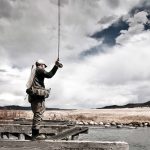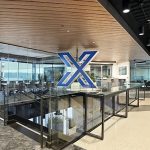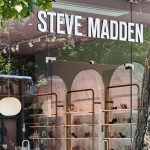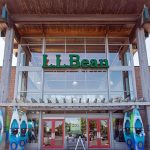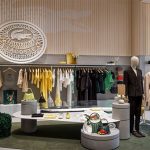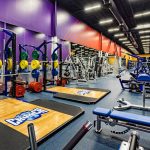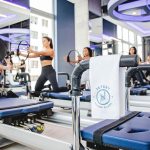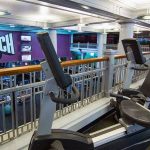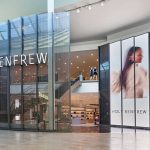Brown Shoe Company, Inc. reported that net sales for the fourth quarter ended January 29 rose 9.8% to $476.5 million from $433.8 million in the year-ago quarter.
Net earnings were $8.5 million, or 46 cents per diluted share, versus $4.7 million, or 25 cents on a restated basis, in the year-ago period.
Fourth quarter 2004 net earnings include the following previously announced charges and recoveries: (i) $0.3 million after-tax, or $0.02 per share, of non-cash expenses related to lease accounting issues; (ii) a charge of $2.2 million after-tax, or $0.12 per diluted share, to satisfy the Company's guarantee of bond financing for a business it divested in 1985 that has filed for bankruptcy and is unable to meet its obligations; and (iii) a non-cash recovery of $1.0 million, or $0.05 per diluted share, of income tax reserves as a result of the American Jobs Creation Act of 2004, which extended the number of periods over which foreign tax credits can be utilized.
Fourth quarter 2003 net earnings included charges of (i) $2.7 million after-tax, or $0.14 per diluted share, to close Brown Shoe's last Canadian footwear factory; (ii) $2.0 million after-tax, or $0.11 per diluted share, related to the Redfield class action litigation; and (iii) as part of the restatement noted above, $0.5 million after-tax, or $0.03 per diluted share, of additional expenses related to lease accounting matters.
“Famous Footwear enabled us to achieve a solid fourth quarter. Full-year results for fiscal 2004, however, fell short of our expectations primarily due to weaknesses in several key areas of our Wholesale business and a poor performance at Naturalizer Retail,” said Brown Shoe Chairman and CEO Ron Fromm. “Looking at the full year, Famous Footwear's momentum built throughout the year, increasing its sales by 4.0% and operating earnings by 16.3%, as its new format and improved product offering began to gain favor with consumers. Within our Wholesale business, LifeStride, Dr. Scholl's and our Women's Private Label businesses all showed improvements, but these gains were not enough to offset poor results at Naturalizer, Bass and our Children's business.
“Looking ahead, we believe Famous Footwear will continue its strong performance, and that the strategies we have put in place within our Wholesale division will lead to improved earnings results in fiscal 2005, starting with the first quarter,” Fromm said. “We remain committed to continuing to invest in our platform in order to differentiate our Famous Footwear stores, build greater preference for our wholesale brands, deliver compelling product, strengthen our talent base, and further our enterprise-wide speed-to-market initiative to improve our global supply chain.”
Net sales for the 52 weeks of fiscal 2004 were $1.942 billion, a 6.0% increase compared to $1.832 billion for the 52 weeks of fiscal 2003.
For fiscal 2004, Brown Shoe net earnings were $43.3 million, or $2.30 per diluted share, compared to $46.2 million, or $2.48 per diluted share, on a restated basis in fiscal 2003. Earnings for fiscal 2004 include the following charges and recoveries: (i) $0.8 million after-tax, or $0.04 per share, of non-cash expenses related to lease accounting issues; (ii) a charge of $2.2 million after-tax, or $0.12 per diluted share, to satisfy the Company's guarantee of bond financing for a business it divested in 1985 that has filed for bankruptcy and is unable to meet its obligations; and (iii) a non-cash recovery of $1.0 million, or $0.05 per diluted share, of income tax reserves as a result of the American Jobs Creation Act of 2004. Offsetting these charges are benefits from reduced compensation costs associated with stock- based and incentive compensation plans.
Earnings for 2003 included charges of $2.7 million after-tax, or $0.14 per diluted share, to close Brown Shoe's last Canadian footwear factory, and $2.0 million after-tax, or $0.11 per diluted share, related to the Redfield class action litigation, and additional expense of $0.7 million after-tax, or $0.04 per diluted share, related to lease accounting issues.
Lease Accounting Issues
As the Company announced on February 28, 2005, it has adjusted its method of accounting for leases to classify construction allowances received from landlords as deferred rent liabilities, instead of reflecting them as a reduction of fixed assets, and to record rent expense over the entire length of its leases including the build-out period of stores. The Company will restate its prior-year financial statements to correct for these errors in its Form10-K for the fiscal year ended January 29, 2005. All financial data in this release that is affected by these changes has been adjusted or restated, as applicable. The effect of these corrections on fiscal 2004 and 2003 was to reduce net earnings by $0.8 million and $0.7 million, respectively.
Famous Footwear Results
For the fourth quarter, Famous Footwear operating earnings were $11.2 million, a 114.8% increase compared to $5.2 million for fiscal 2003, as restated to reflect lease accounting adjustments. Net sales increased 8.7% to $263.1 million in 2004 versus $242.0 million in the fourth quarter 2003. The chain increased same-store sales for the quarter 4.1%.
For fiscal 2004, Famous Footwear achieved a 16.3% increase in operating earnings to $60.3 million, versus $51.8 million in fiscal 2003 on a restated basis. Sales for the year were up 4.0% to $1.117 billion compared to $1.074 billion in 2003. For the year, same-store sales were up 0.8%. A total of 70 stores were opened and 44 were closed, to end the year with 919 stores. The new stores averaged about 7,300 square feet each, while the closed stores averaged about 6,200 square feet. Accordingly, total square footage increased slightly to 6.4 million feet at the end of fiscal 2004. For 2005, plans are to open about 80 stores and close about 35 stores.
“The Famous Footwear management team has done an outstanding job. If you look at our stores today there is no comparison to the chain we were four years ago,” said Fromm. “We've improved product assortments, adding a continuous flow of new and many exclusive products to our mix. Inventories are fresh and current. And the new store environment makes shopping fun. In 2005, we look to further improve store traffic levels and expect to achieve same-store sales improvements of 1% to 2% over 2004.”
Wholesale Division Results
For the fourth quarter, Wholesale sales were $158.8 million, up 11.5% from the $142.3 million recorded a year ago. Operating earnings for the quarter declined 13.4% to $12.7 million, versus $14.7 million in the year-ago quarter, due to lower sales and higher allowances at Naturalizer, first-year losses and transition costs in our Bass business, and a sales decline in our Children's business. Forward orders at the end of the period were up 13%, approximately 4% of which is from the new Bass business.
For the full year, Wholesale sales were $615.9 million, up 9.7% from $561.3 million in 2004. Operating earnings for the full year were $44.9 million, down 19.6% from $55.8 million in 2003, reflecting the challenges in Naturalizer, Bass and Children's.
Gains in operating earnings were achieved by the Company's LifeStride, Carlos by Carlos Santana, Dr. Scholl's, and Private Label footwear businesses.
Sales of the Company's flagship Naturalizer brand declined 8.8% in fiscal 2004 as our product performance lagged in an environment where consumer preference shifted away from casual footwear in the moderate zone. Despite this decline, Naturalizer captured the No. 2 spot in U.S. department stores, with 4.7% of market share in 2004, down slightly from 4.9% in 2003. In 2003, the brand held the number three position. In 2001, the brand was in fourth position and was sixth in 2000. [Note: All market share data is based on independent research from The NPD Group, Inc.]
Sales of the Company's LifeStride brand rose 8.3% in 2004, as this brand earned 2.2% of department store market share, even with 2003. LifeStride ranks 10th among brands in U.S. department stores.
“Our Wholesale business was mixed this year,” Fromm said. “We have taken this opportunity to implement a number of initiatives that are designed to improve performance in 2005. First, Naturalizer: under its new management, the brand will tighten its assortments and dial-up its product design while ensuring its promise of comfort. Second, Bass: with the transition of this newly acquired brand complete, we are focusing on product styling and a business model that delivers higher margins for both Brown Shoe and our retail partners. Third, Children's: with the addition of several new licenses, we believe we have stabilized this business.”
Specialty Retail Results
For the fourth quarter, our Specialty Retail division, comprised of 359 Naturalizer stores located throughout the U.S. and Canada and 16 FX LaSalle stores in Canada, posted sales of $48.1 million in 2004, versus $46.9 million in the year-ago quarter. An operating loss of $4.8 million was incurred in the quarter, compared to an operating loss of $1.4 million in the year-ago quarter, due to markdowns and resulting lower margins needed to drive traffic and clear seasonal footwear. Same-store sales for the quarter were down 3.6% in the U.S. and up 0.4% in Canada.
For the full year, sales for the division were $191.6 million, compared to $189.2 million for 2003. In 2004, 20 stores were opened; 23 were closed. An operating loss of $11.0 million was incurred in 2004, compared to an operating loss of $3.9 million in 2003 on a restated basis. These results reflect a 1.1% same-store sales decline in the 171 Canadian stores, and a 2.2% same-store sales decline in the 204 U.S. Naturalizer stores due to lower-than-expected store productivity in 2004.
At year's end, there were 375 Specialty Retail stores, compared to 378 at the end of fiscal 2003. Plans are to open about 10 stores and close about 30 stores in fiscal 2005.
“Our Naturalizer retail segment had a very disappointing year,” said Fromm. “As a result, we've restructured the business to adopt a pure specialty retail approach. Our go-forward focus will be on improved merchandising, improved product offering, and at the same time we will aggressively manage the expense structure. The division's new leader, John Mazurk, brings a breadth of experience in retail, including a significant contribution at Famous Footwear, where he ran store operations for the past three years.”
Financial Position and Forward-Looking Guidance
The Company's financial position remains strong. Net cash provided by operating activities in fiscal 2004 was $53.3 million. Total debt increased to $142.0 million from $119.5 million at year-end in 2003, primarily reflecting the investment in accounts receivable and inventory from the Bass business. Interest expense declined 19.7% to $7.5 million. The debt-to-capital ratio at year-end was 26.6% versus 25.4% last year.
Looking ahead, the company estimates net earnings per diluted share of $2.55 to $2.65 for fiscal year 2005. This estimate includes costs of approximately $0.20 per share to expense stock options, as Brown Shoe is adopting the Statement of Financial Accounting Standards No. 123(R) – Share Based Payment, in the first quarter of 2005. In addition, the Company is evaluating the provisions of the American Jobs Creation Act of 2004, and anticipates that it will repatriate approximately $70-$80 million in 2005. Pending the receipt of technical guidance from the U.S. Treasury Department, the Company currently estimates that this repatriation will result in income tax expense of approximately $10 million. Such cost is not included in the above earnings guidance.
Net earnings for the first quarter are estimated to be in the range of $0.60 to $0.70 per diluted share versus $0.45 in 2004. This estimate includes an expense for stock options of approximately $0.05 per diluted share in the first quarter of fiscal 2005.
BROWN SHOE COMPANY, INC.
CONDENSED CONSOLIDATED STATEMENTS OF EARNINGS
(Thousands, except per share data)
As Restated As Restated
Thirteen Weeks Ended Fifty-Two Weeks Ended
January 29, January 31, January 29, January 31,
2005 2004 2005 2004
Net Sales $ 476,490 $ 433,847 $1,941,804 $1,832,108
Cost of Goods Sold 288,776 252,885 1,157,437 1,073,442
Gross Profit 187,714 180,962 784,367 758,666
- % of Sales 39.4% 41.7% 40.4% 41.4%
Selling & Administrative
Expenses 179,113 171,062 720,013 682,674
- % of Sales 37.6% 39.4% 37.1% 37.3%
Provision for Litigation
Costs 586 3,107 586 3,107
Operating Earnings 8,015 6,793 63,768 72,885
Interest Expense, Net 1,398 1,958 7,481 9,319
Earnings Before Income Taxes 6,617 4,835 56,287 63,566
Income Tax Benefit
(Provision) 1,928 (179) (12,982) (17,330)
NET EARNINGS $ 8,545 $ 4,656 $ 43,305 $ 46,236
Basic Net Earnings
per Common Share $ .48 $ .26 $ 2.42 $ 2.62
Diluted Net Earnings
per Common Share $ .46 $ .25 $ 2.30 $ 2.48

